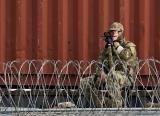Trump immunity claim in election interference case heard by ...

WASHINGTON — The Supreme Court on Thursday indicated that any trial in former President Donald Trump's election interference case is unlikely to take place anytime soon, with justices expressing concerns about whether certain presidential acts should be off-limits.
Although the court appears likely to reject Trump's expansive claim of absolute immunity, it could remand the case for further proceedings, further delaying the chance of a trial taking place before the election.
The court is weighing the novel legal question of whether a former president can be prosecuted for what Trump’s attorneys say were “official acts” taken in office, though much of the focus remains on whether the justices will rule quickly so a trial could take place before the November election.
With most legal experts questioning Trump's broad argument that the entire election interference indictment should be dismissed based on immunity, the court's eventual ruling on the extent to which official acts are protected and how quickly it rules will be of equal importance.
While the court's three liberal justices appeared most sympathetic to prosecutors, the court's conservatives seems to have differing views on the scope of presidential immunity, making it unclear exactly how the court will rule.
Several justices raised concerns about the broad implications for future presidents, with most steering clear of discussion of the specific allegations against Trump.
"If an incumbent who loses a very close, hotly contested election, knows that a real possibility after leaving office is not that the president is going to be able to go off into a peaceful retirement, but that the president may be criminally prosecuted by a bitter political opponent, will that not lead us into a cycle that destabilizes the functioning of our country as a democracy" asked conservative Justice Samuel Alito.
Justices seemed skeptical of the argument that blanket immunity would apply to a former president, and Justice Amy Coney Barrett — a Trump nominee herself — was among those who zeroed in on what type of behavior Trump's lawyers maintained were private acts or official acts.
Michael Dreeben, the Justice Department lawyer arguing on behalf of special counsel Jack Smith, said in response to Barrett that it would be possible to proceed with the prosecution even if official acts were omitted.
The case puts considerable scrutiny on the court, which has a 6-3 conservative majority that includes three justices Trump appointed. The court already handed Trump an election-year boost when it ruled last month that Colorado could not kick him off the ballot.
The justices have also come under criticism for their delay in taking up Trump's appeal, which some view in itself as a victory for him.
The Supreme Court announced Feb. 28 that it would hear the case, saying it would examine "whether and if so to what extent does a former president enjoy presidential immunity from criminal prosecution for conduct alleged to involve official acts during his tenure in office." The decision immediately put the prospect of a pre-election trial in jeopardy.
Trump on Thursday morning prefaced the hearing with a post on his social media site that echoed an argument in his court brief, which said denying a president immunity would open him up to "extortion" from political opponents to force him to meet their demands or risk prosecution.
"If a President doesn’t have IMMUNITY, he/she will be nothing more than a 'Ceremonial' President, rarely having the courage to do what has to be done for our Country," Trump wrote.
A federal appeals court had ruled Feb. 6 that Trump was not immune from prosecution, writing that "former President Trump has become citizen Trump, with all of the defenses of any other criminal defendant," and that while executive privilege may have protected him during his presidency, it no longer protected him against prosecution.
"It would be a striking paradox if the President, who alone is vested with the constitutional duty to 'take Care that the Laws be faithfully executed,' were the sole officer capable of defying those laws with impunity," the federal appeals court ruled.
Under the original schedule laid out by U.S. District Judge Tanya Chutkan, Trump's trial had been set to begin March 4, and the jury might have even reached a verdict by this point. Instead, the first of the four criminal cases against Trump to go to trial was the prosecution brought by Manhattan District Attorney Alvin Bragg in New York, where Trump was indicted on 34 counts of falsifying business records tied to a hush money payment in the lead-up to the 2016 election. He has pleaded not guilty to all charges.
The federal indictment returned by a grand jury in Washington, D.C., in August consisted of four counts: conspiracy to defraud the United States, conspiracy to obstruct an official proceeding, obstruction of and attempt to obstruct an official proceeding, and conspiracy against rights. The Supreme Court has already heard arguments in another Jan. 6 case that could affect two of the charges against Trump involving obstruction of an official proceeding.
Trump, according to the indictment, conspired to "overturn the legitimate results of the 2020 presidential election by using knowingly false claims of election fraud to obstruct the government function by which those results are collected, counted and certified.”
The indictment focuses on Trump’s involvement in a scheme to submit fake election certificates to Congress in the hope that they would nullify President Joe Biden’s victory. The chain of events culminated in the riot at the U.S. Capitol on Jan. 6, 2021.

Federal prosecutors led by special counsel Jack Smith say Trump's actions constituted a series of crimes. Trump says he was merely expressing his concerns, which were not based on any evidence, that the election was plagued with fraud. He has pleaded not guilty to the federal charges.
While numerous Jan. 6 defendants have acknowledged that they were duped and manipulated or that they lacked the critical thinking skills to recognize the lies about the 2020 election for what they were, Trump and his lawyers have insisted that he sincerely believed the election was stolen.
Smith, meanwhile, has argued in court papers that Trump has no immunity and that the case should go to trial immediately — whether or not his conduct at the time involved official acts.
Trump's lawyers cite, among other things, a 1982 Supreme Court ruling that said presidents are immune from civil suits when the alleged conduct falls within the "outer perimeter" of their official duties. That case has never been applied in the criminal context.
Smith's team previously estimated it would need "no longer than four to six weeks" to present its case to a jury; potential jurors were told the trial "may last approximately three months after jury selection is completed." At the time the case was put on hold in December, when the federal appeals court agreed to take it up, 88 days were left in the trial preparation schedule.
That timeline — nearly three more months of trial prep before jury selection begins — makes a verdict before Election Day unlikely, although Chutkan has indicated that the case would proceed like any other criminal prosecution and that Trump's campaign schedule would not have an impact on the court.


 United States
United States Argentina
Argentina  Australia
Australia  Austria
Austria  Brazil
Brazil  Canada
Canada  Chile
Chile  Czechia
Czechia  France
France  Germany
Germany  Greece
Greece  Italy
Italy  Mexico
Mexico  New Zealand
New Zealand  Nigeria
Nigeria  Norway
Norway  Poland
Poland  Portugal
Portugal  Sweden
Sweden  Switzerland
Switzerland  United Kingdom
United Kingdom 
























